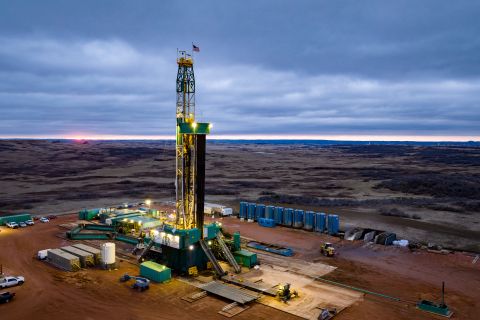The Canadian government on April 6 approved a $12 billion offshore oil project proposed by Norway's Equinor ASA after an environmental assessment concluded it would not cause significant adverse effects.
The Bay du Nord project would involve building a floating platform to drill an estimated resource of 300 MMbbl of light crude oil in the Atlantic Ocean, about 500 km (310 miles) off the coast of Canada's Newfoundland and Labrador province.
Environmental groups blasted the move, which comes days after a U.N. report warned the world risked climate disaster without severe emissions cuts.
"The decision is tantamount to denying that climate change is real and threatens our very existence," said Julia Levin, program manager at Environmental Defense.
Bay du Nord would be Canada's first remote deepwater project at around 1,200 m (4,000 ft) deep and has come to symbolize the tension between Canada's climate goals and concerns about energy security in the wake of Russia's invasion of Ukraine.
Prime Minister Justin Trudeau's liberal government has pledged to cut emissions 40%-45% below 2005 levels by 2030 but in recent weeks has been exploring ways to increase energy exports to Europe to displace Russian supplies.
Oil and gas is Canada's highest-polluting sector, accounting for 26% of emissions.
Equinor and partner Cenovus Energy have not yet made a final investment decision on whether to build the project, but the Norwegian firm said it welcomed the ministry's decision.
"We now look forward to progressing this key investment in Canada, which has the potential to produce the lowest carbon oil in the country," Equinor said in a statement.
Canada's Environment Minister Steven Guilbeault laid out 137 conditions that Equinor must meet, including protecting fish habitat and migratory birds.
Shortly before releasing the decision, the government also said it will develop requirements for new oil and gas projects, including Bay du Nord, to achieve net-zero emissions by 2050.
Any potential blowout – an uncontrolled release of oil – from the offshore project would endanger whales, fish and seabirds, said Gretchen Fitzgerald, national programs director for Sierra Club Canada Foundation.
Canada Action, a pro-resource development group, said the oil produced offshore of Newfoundland and Labrador has relatively low carbon intensity, and the project would create many years of jobs.
Recommended Reading
Smart Tech Moves to the Hazardous Frontlines of Drilling
2024-10-08 - In the quest for efficiency and safety, companies such as Caterpillar are harnessing smart technology on drilling rigs to create a suite of technology that can interface old and new equipment.
E&P Highlights: Sept. 23, 2024
2024-09-23 - Here's a roundup of the latest E&P headlines, including Turkey receiving its first floating LNG platform and a partnership between SLB and Aramco.
Navigating the Crossroads: Oil, Gas Industry Reimagines its Role in Tech Age
2024-10-28 - The oil and gas industry has both a need and an opportunity to embrace the digital transformation while engaging the next generation of its workforce.
US Drillers Cut Oil, Gas Rigs for Fifth Week in Six, Baker Hughes Says
2024-09-20 - U.S. energy firms this week resumed cutting the number of oil and natural gas rigs after adding rigs last week.
E&P Highlights: Oct. 28, 2024
2024-10-28 - Here’s a roundup of the latest E&P headlines, including a new field coming onstream and an oilfield service provider unveiling new technology.
Comments
Add new comment
This conversation is moderated according to Hart Energy community rules. Please read the rules before joining the discussion. If you’re experiencing any technical problems, please contact our customer care team.




